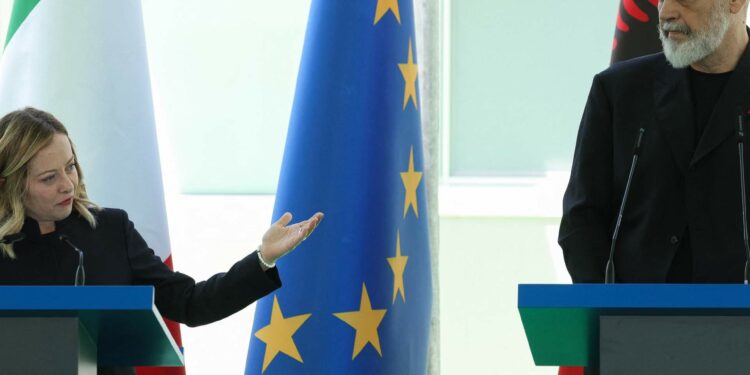Imagine for a moment that you are a racist Western government plagued by an influx of asylum seekers, many of them dark-skinned. Wouldn’t you dream of packing them off to a distant land to be dealt with out of sight and out of mind?
Well, that dream is now becoming a reality for Italy, where Prime Minister Giorgia Meloni of the far-right Fratelli d’Italia (Brothers of Italy) party is overseeing an agreement with the Balkan nation of Albania to open two processing centres for seaborne asylum seekers intercepted en route to Italian shores.
Located in the northern Albanian towns of Shengjin and Gjader, the centres are expected to hold up to 36,000 people per year. The scheme will cost Italy at least 670 million euros ($720m) for the initial five-year period – but the price tag is apparently worth it in terms of racking up xenophobic nationalist points for the government.
Meloni, who rode to power on an array of fascist-friendly promises including a pledge to curb immigration, travelled to Albania on June 5 to visit the migrant penal colonies – pardon, asylum processing centres – which she says will be up and running by August. The visit was timed to coincide with the eve of European Union elections, in which Fratelli d’Italia fared spectacularly.
European Commission President Ursula von der Leyen has praised the Italy-Albania agreement as an “important initiative” that constitutes an “example of out-of-the-box thinking, based on fair sharing of responsibilities with third countries in line with obligations under EU and international law”.
Never mind that the deal is in fact a violation of international law governing rescues at sea as well as a breach of the prohibition on automatic detention.
It is also not clear why Albania, a country that was itself a short-lived colony of Italy and played no role in the catastrophic European colonial enterprise that set the stage for current migration patterns, should be responsible for “sharing” the burden of dealing with refugees.
Recall that Italy’s 20th century exploits in Africa entailed conducting genocide in Libya and terrorising Ethiopia. But heaven forbid any present-day Africans think themselves entitled to, you know, come look for work or a better life in Italy.
Nor, to be sure, is the practice of offshoring asylum processing quite as novel and “out of the box” as von der Leyen suggests. On and off since 2001, for example, Australia has deflected incoming asylum seekers onto the Pacific island nation of Nauru as well as Papua New Guinea’s Manus Island – an arrangement that has proved physically and psychologically destructive and has resulted in numerous suicides and suicide attempts by refugees among other forms of self-harm.
Rendering the panorama all the more sadistic is the obscene expense of Australia’s offshore operations. In 2022, Human Rights Watch reported that detaining a single asylum seeker on Nauru or Manus Island cost about 1.8 million British pounds ($2.3m) per year.
Britain, meanwhile, is threatening to finally implement in July its long-awaited plan to deport asylum seekers to Rwanda thousands of kilometres away – which despite its dismal human rights record has been determined to be just the place for United Kingdom-bound refugees.
Then, of course, there is the United States’s preferred approach to asylum, which is to dismantle the concept altogether.
Offshore precedents notwithstanding, the Italy-Albania agreement is unique in one respect: The processing centres in Shengjin and Gjader will be under Italian rather than Albanian jurisdiction.
Sounds sort of colonial.
In a January report on the deal, Amnesty International noted that Italy has been a “trailblazer for the externalisation of border control”, having collaborated for the past two decades with Libya – another former Italian colony – in thwarting the movement of asylum seekers.
Over the years, Italian contributions to the partnership have included facilitating Libya’s interception at sea of thousands upon thousands of refugees who were then returned to Libyan detention centres to face an assortment of perils, ranging from enforced disappearances to torture and killing.
Tunisia, too, has received an Italian helping hand in cracking down on migration, an arrangement that has fuelled human rights abuses but has solidly failed to deter Europe-bound asylum seekers.
And while Meloni has advertised the Albania scheme as an “extraordinary deterrent against illegal migrants trying to reach Italy and Europe”, it will no doubt prove to be just another costly forum for politically expedient human rights violations.
As Amnesty International pointed out, Shengjin is located more than 500 nautical miles (926km) from the area in the central Mediterranean Sea where most refugees are rescued, meaning it would take two or three days to transport shipwreck survivors there – as opposed to more proximate locations in Italy or Malta.
These are people who are “often traumatised” for various reasons, from having experienced torture in captivity to having witnessed loved ones drown. The report determined: “In such situations, unnecessarily forcing them to spend days onboard rescue ships, where crews cannot fully cater to their needs, constitutes a violation of international standards on search and rescue, and may in itself amount to illtreatment.”
Once on Albanian soil – or is it Italian soil again? – these same people will be indefinitely swallowed up by a neocolonial detention apparatus, safely out of sight and out of mind.
According to Meloni, the Italy-Albania agreement is a “model” that could be “replicated in many countries” and could even “become part of the structural solution” of the EU.
But if this is “out-of-the-box thinking”, it’s time to get back in the box.
The views expressed in this article are the author’s own and do not necessarily reflect Al Jazeera’s editorial stance.
Source link : https://www.aljazeera.com/opinions/2024/6/18/nothing-out-of-the-box-about-italys-asylum-offshoring-deal-with-albania
Author :
Publish date : 2024-06-18 07:00:00
Copyright for syndicated content belongs to the linked Source.


